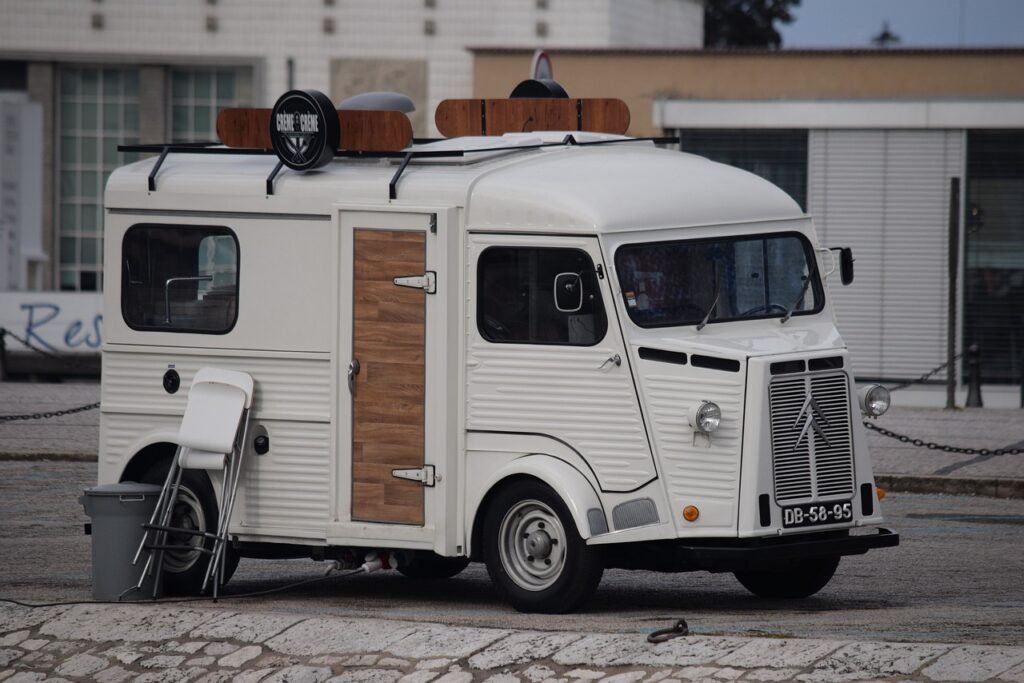If you are considering opening a food truck business, this article will provide some essential tips and advice. Consider insurance issues and other factors if you decide to run a profitable venture. In this step-by-step guide, we will look at the diversified perspectives of Food Truck Business Insurance, which include easy access for small companies to buy customized policies that satisfy their business needs.
Due to the risks and challenges of food truck operations, specific safeguards cannot be overstated. Group insurance is necessary due to automobile crashes and food preparation and delivery legal difficulties.
In this blog, you’ll get a beginner guide about different insurance types you can get for your Food Truck Business Insurance, such as general liability, commercial auto, and property coverage, as well as determining the amount you should get for each type based on your business.
Whether you are an experienced food truck owner or just starting, this guide consists of all facets to help you evaluate the insurance needs you will decide on based on sufficient information.
What Makes Food Truck Business Insurance Essential For You As A Food Truck Business Owner?
When running a food truck, security issues and problems have to be handled differently. Putting on the wheel of a vehicle opens the door to car crashes and liability issues, so letting insurance be available is necessary.
1. Protecting Your Investment
To establish a food truck business, you must invest a lot of money. Many start-up expenses are involved, such as buying trucks, equipment, and supplies and filing for permits and licenses. Through insurance, all this can disappear in case of an accident, or somebody gets sick as a result of your food.
2. Protecting Against Liability
As a food truck proprietor, you shoulder the responsibility for your customer’s security. Accidents happen; if someone falls or gets injured when in your (commercial) vehicle, you could be held responsible. Moreover, your business may face substantial fees if someone gets sick from consuming your prepared food. Insurance saves you from meeting these (unforeseen) liabilities.
3. Meeting Legal Requirements
Mostly, it is a must that food truck businesses acquire a policy for insurance. Failure to fulfill the requirements may result in fines, penalties, and even the closure of your business. You can ensure that you are breaking no laws by getting the required kind of insurance; as long as you have that, you can run your business without any problems.
Types Of Insurance Coverage For Food Truck Business Insurance
There are a variety of different insurance policies required for food truck operators. Each specific type of protection stands for a definite risk and acts as insurance against the unforeseeable circus. We will now review the most crucial insurance coverage types for food trucks.
Consequently, general liability insurance for a food truck is needed. Basic liability insurance serves as the core of any food truck insurance package. It offers coverage for legally required insurance, such as bodily injury and property damage that may arise when operating your business. This would include accidents occurring on your truck, such as slipping and falling, as well as people’s owned property damage.
Similarly, the liability section of general insurance covers the product liability feature that is important in food trucks. If ill people sue you after eating your food, this policy will prevent you from being held responsible and facing financial consequences.
1. General Liability Insurance
The total cost for general liability insurance for food trucks can drop from $500 to $3000 a year. The size of your establishment, the number of staff you bill for, and your geography are all determinants of the final amount.
2. Property Finances For Food Trucks
Another insurance that you should consider is the property insurance for food trucks. Safeguarding your truck and its content against various risks is what insurance does. These risks range from fire, theft, and vandalism to natural disasters. Since your food truck is the “soul” of your business, property insurance protects you from repairing damages and returning to the street.
Property insurance would also cover your equipment and supplies, such as cooking equipment, freezers, and supply inventory. If any of these properties were to be destroyed or stolen, then the property insurance would cover the replacement or the repair.
3. Auto Insurance For A Food Truck
Auto insurance is a must-have element in any food truck business. The main reason is that you will have to drive your pick-up to various destinations to avoid car accidents on the roads. Automobile insurance for food trucks commonly features liability coverage that compensates for any property damages or injuries sustained by others in a collision that involves your vehicle.
Liability coverage is not the only choice; you can also choose comprehensive and collision coverage. Comprehensive insurance covers your semi-truck from non-accident damage like theft or vandalism, and collision coverage will help you pay for the damages inflicted during a crash.
4. Health Insurance Of Food Truck Workers
When an employee works at a food truck you run, the Worker’s compensation insurance is needed. Hence, compensation coverage plays a helpful role in the case of injured employees or those who fall sick while attending work. It is used to consider the treatment cost, lost work, and habilitation.
Workers’ compensation insurance is not just one of the safeguarding measures against potential work accidents but also a very robust protection for businesses against lawsuits. This cover, by implication, will demonstrate that you care for the health and safety of the very personnel who work for you and will have no choice but to comply with the laid down statutory obligations.
How To Choose The Right Insurance Provider For Your Food Truck Business
It is of the essence to choose your insurer right to get coverage at a cost that will not overwhelm you. Below are the various factors to think about when selecting the insurance company for the needs of your food truck business.
1. Experience And Expertise
Search for an insurance company that deals specifically with the part of the food truck business. They will know the specific risks and challenges food truck owners encounter and recommend policies that suit your concrete needs.
2. Coverage Options
They provided that the insurance company could provide the types of coverage needed, as we discussed earlier. Supolicies should be tailor-made to incorporate general liability, property, auto, and workers’ compensation coverage.
3. Cost
Cost should be one of many considerations you wish to understand; ensure your chosen policy fits within your budget. Go and check quotes from other insurance providers to ensure you get the best coverage at the cheapest rates.
4. Customer Service
Good customer service is necessary for all insurance companies. You wish to have an insurer wholly committed to responding, helping, and rendering a helping hand when you need it the most. Survey reviews/ask for suggestions to understand the company’s service quality.
The cost of insuring food trucks is an essential factor, but it becomes insignificant when weighed against the benefits.
Food truck insurance costs depend on several factors, like the kind of coverage you need, the worth of your truck and equipment, your town, and your claims history. There are no secret formulas to follow in this case. However, you can get a preliminary idea of what you should expect.
Conclusion: Food Truck Business Insurance
Food Truck Business Insurance is a critical investment that shields your mobile culinary business from risks and liabilities that may arise unexpectedly. By knowing various kinds of coverage, assessing your business needs and budget, and identifying affordable options, you can help yourself stand in the face of unexpected events that will help you concentrate on serving your customer’s delicious dishes.
FAQs
Is Food Truck Owners’ Insurance Mandatory?
Thus, it is clear that the red tape business encounters is caused by various barriers, such as regulations, laws, permits, tariffs, and quality standards, which must be addressed.
It depends on where the food truck is planning to operate and whether it is an insurance requirement, although most food trucks tend to be insured for safety and liability reasons.
How Much Will I Have To Pay For The Food Truck Insurance?
This is where the price of insurance for a restaurant is derived as it is surrounded by different things such as household, location, kind of food, coverage limits, and claims record. As an option, it is better to acquire estimates from several insurance companies to compare the quotes regarding prices and coverage.
What If I Collide Unexpectedly With The Street Food Truck?
If you have an accident, you must call your provider immediately, find out the rules for making the claim, and do whatever is prescribed. Your insurance policy will include car damage protection, injury protection, and other expense-related cases.
Should I Buy The Workers’ Comp Insurance Even Though I Am The Only Employee Working On My Food Truck?
Based on local laws and bureaucratic rules, workers’ compensation insurance is likely required whether you are a sole employee or not. It will save you from litigation or fines. Thus, you should consult with an insurance agent before starting to do anything to prevent injuries in the workplace.
May I Renew My Insurance Policies If My Business Plans Grow Larger?
It is sensible to check and update your insurance policy if your business activities get modified. As your mobile food stall operation develops or if you decide to add new services, you must periodically review the policy terms with the insurer to ensure the business risk profile is at the right level.
Follow Probusinesshacks for more business guides!







